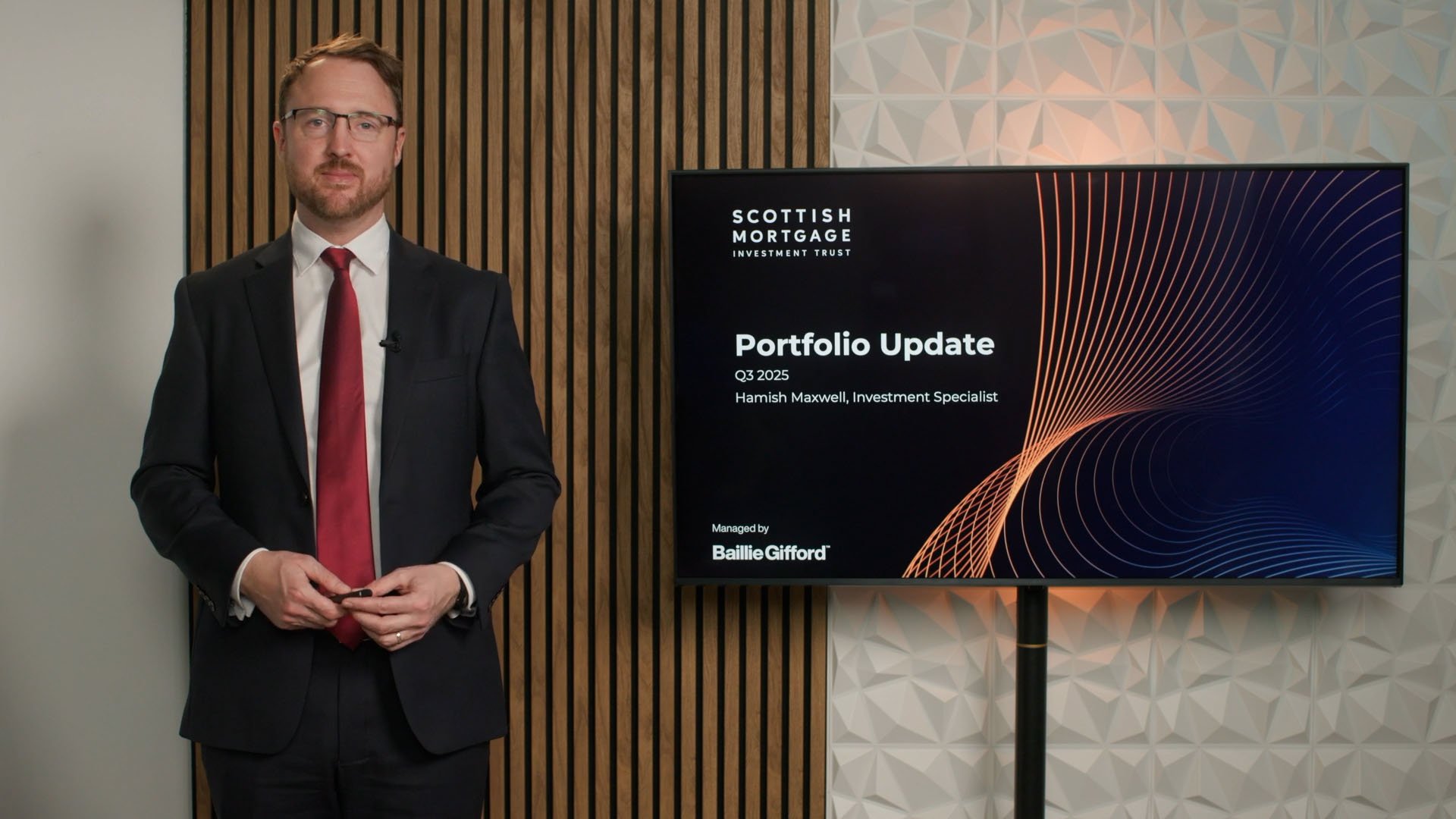HelloFresh: changing how people eat forever
Key Points
- On a mission to change how people eat forever, HelloFresh CEO Dominik Richter sits down with Lawrence Burns in the latest episode of Invest in Progress
- By building strong supplier relationships globally and mastering the ‘art and science’ of recipe development, HelloFresh streamlines the journey from farm to front-door, reducing food waste and providing hassle-free meal options for consumers
- Lawrence explains HelloFresh’s secret ingredient – constant improvement to the proposition, an incredible ability to scale the service, and a long-term outlook from management

As with any investment, your capital is at risk.
With its innovative approach to reducing the pain of meal planning and grocery shopping, the direct-to-consumer (DTC) meal-kit delivery service HelloFresh reduces food waste by providing convenient and healthy meal options straight to its customers' doorsteps.
In Scottish Mortgage’s Invest in Progress podcast, Deputy Manager Lawrence Burns hears from Dominik Richter, co-founder and chief executive of HelloFresh, about the company’s progress in its mission to “change the way people eat forever”.
Food, glorious food
The genesis of HelloFresh was three friends that wanted to flex their passion for entrepreneurship by addressing a large market need. They alighted on the $7bn global food industry, where they recognised households struggle to find the time and resources to cook healthy and nutritious meals.
Having identified consumers’ problems and challenges in maintaining a varied and balanced diet, they worked backwards to pioneer the meal-kit concept. Starting in Germany in 2011, HelloFresh expanded across Europe to North America and is now in 18 countries worldwide.
Reducing food waste by building strong supplier relationships
Traditional food supply chains often result in large amounts of waste. Richter states, “About one-third of the [US] harvest never makes it to the customer.”
With HelloFresh, it’s a case of less is more:
The fewer touches a product requires, the fewer stops, the fewer intermediaries, the fresher it is and the more potential to extract margin you have. So, it’s both good for business and the consumer; it’s good for the environment, so it’s a win-win.
The company has built direct, “very tight integrations and relationships” with around 2,500 suppliers globally. That helps maintain the quality and variety of its meal offerings.
An art and a science
Creating and delivering the “right” recipes and meal-kit menus at scale is complex. Richter notes:
We develop the recipes and menus and then source all the ingredients, repackage them into the exact quantities you need to cook these delicious meals and deliver them to your doorstep.
Meticulous recipe development and menu creation sets HelloFresh apart from its competitors, whom he says have “really underappreciated the art and science behind that”.
To begin with, “It was about ‘what are five or ten meals that have mass market appeal, and how can you still ensure that you have variety week over week, month over month?’”
Today, HelloFresh boasts a recipe database of about 10,000 recipes. It delivers approximately a billion meals annually and caters to a wide range of customer groups, cost, taste and variety preferences.

Factoring in a better consumer experience
A focus on improving the customer experience is the hallmark of HelloFresh’s culture. Richter confirms,
We continuously work on the proposition and the customer experience. My north star is that I want to be very confident that, every year, the product we’re building is much, much better than the product we had in the previous year.
This was evident during the Covid-19 pandemic when it entered the ready-to-eat (RTE) market by acquiring Factor75. The move was motivated by customer research, which identified that, unlike the meal kits, “ready meals are usually consumed when you’re alone”.
With this applying to less than 10 per cent of HelloFresh’s meal-kit customers, this is a complementary market where HelloFresh can quickly leverage its existing capabilities to rapidly expand its total addressable market.
“A lot of the muscles we need to be good at operating a ready-to-eat business are the same muscles that you need to operate a meal kit business,” he says.
That’s why Richter thinks his company can offer a larger range of more nutritious, much tastier and healthier ready meals than its retail competitors at a competitive price point.
In doing it well, HelloFresh can address consumers’ challenges in eating well in different circumstances, such as when you need a quick meal, but don’t want to compromise on nutrition or taste. He says, “In my view, there is very little reason why this business line shouldn’t become as big as meal kits is today.”
Burns agrees that, “what’s next in the journey . . . with ready-to-eat, with new DTC offerings over time,“ earns the company its place in the Scottish Mortgage portfolio.

Listen to the latest episode of the Invest in Progress podcast, to discover more about how HelloFresh manages its supply chain to reduce the time from farm to table.
Listen to the podcast here.
Delayed Gratification
Here, it sits alongside innovative food-related companies, from Ocado to Delivery Hero and DoorDash. Looking across these companies helps the managers’ ascertain how the food industry is changing and evolving.
Burns notes, “[HelloFresh] could have reached profitability sooner and produced much higher margins than it does today had it decided to sit back and not reinvest that money into the product.”
But the fact that Richter hasn’t and “is willing to delay gratification to achieve that ambition is vital” in aligning HelloFresh’s management with Scottish Mortgage’s long-term investment horizon.
If HelloFresh continues to enhance its offerings, even a slight increase in market share could lead to significant growth over time due to the vast global food market. The company is poised to shape the future of the food industry, providing consumers with convenient, healthy and sustainable meal options.
Regulatory Information
This content was produced and approved at the time stated and may not have been updated subsequently. It represents views held at the time of production and may not reflect current thinking. Read our Legal and regulatory information for further details.
A Key Information Document is available by visiting our Documents page. Any images used in this content are for illustrative purposes only.
This content does not constitute, and is not subject to the protections afforded to, independent research. Baillie Gifford and its staff may have dealt in the investments concerned. The views expressed are not statements of fact and should not be considered as advice or a recommendation to buy, sell or hold a particular investment.
Baillie Gifford & Co and Baillie Gifford & Co Limited are authorised and regulated by the Financial Conduct Authority (FCA). The investment trusts managed by Baillie Gifford & Co Limited are listed on the London Stock Exchange and are not authorised or regulated by the FCA.
Baillie Gifford Asia (Hong Kong) Limited 柏基亞洲(香港)有限公司 (BGA) holds a Type 1 licence from the Securities and Futures Commission of Hong Kong to market and distribute Baillie Gifford’s range of collective investment schemes and closed-ended funds such as investment trusts to professional investors in Hong Kong.
Baillie Gifford Asia (Singapore) Private Limited (BGAS) is regulated by the Monetary Authority of Singapore as a holder of a capital markets services licence to conduct fund management activities for institutional investors and accredited investors in Singapore. BGA and BGAS are wholly owned subsidiaries of Baillie Gifford Overseas Limited, which is wholly owned by Baillie Gifford & Co.
Europe
Scottish Mortgage Investment Trust PLC (the “Company”) is an alternative investment fund for the purpose of Directive 2011/61/EU (the “AIFM Directive”). Baillie Gifford & Co Limited is the alternative investment fund manager (“AIFM”) of the Company and has been authorised for marketing to Professional Investors in this jurisdiction.
This content is made available by Baillie Gifford Investment Management (Europe) Limited (“BGE”), which has been engaged by the AIFM to carry out promotional activities relating to the Company. BGE is authorised by the Central Bank of Ireland as an AIFM under the AIFM Regulations and as a UCITS management company under the UCITS Regulation. BGE also has regulatory permissions to perform promotional, advisory and Individual Portfolio Management activities. BGE has passported its authorisations under the mechanisms set out in the AIFM Directive.
Belgium
The Company has not been and will not be registered with the Belgian Financial Services and Markets Authority (Autoriteit voor Financiële Diensten en Markten / Autorité des services et marchés financiers) (the FSMA) as a public foreign alternative collective investment scheme under Article 259 of the Belgian Law of 19 April 2014 on alternative collective investment institutions and their managers (the Law of 19 April 2014). The shares in the Company will be marketed in Belgium to professional investors within the meaning the Law of 19 April 2014 only. Any offering material relating to the offering has not been, and will not be, approved by the FSMA pursuant to the Belgian laws and regulations applicable to the public offering of securities. Accordingly, this offering as well as any documents and materials relating to the offering may not be advertised, offered or distributed in any other way, directly or indirectly, to any other person located and/or resident in Belgium other than to professional investors within the meaning the Law of 19 April 2014 and in circumstances which do not constitute an offer to the public pursuant to the Law of 19 April 2014. The shares offered by the Company shall not, whether directly or indirectly, be marketed, offered, sold, transferred or delivered in Belgium to any individual or legal entity other than to professional investors within the meaning the Law of 19 April 2014 or than to investors having a minimum investment of at least EUR 250,000 per investor.
Germany
The Trust has not offered or placed and will not offer or place or sell, directly or indirectly, units/shares to retail investors or semi-professional investors in Germany, i.e. investors which do not qualify as professional investors as defined in sec. 1 (19) no. 32 German Investment Code (Kapitalanlagegesetzbuch – KAGB) and has not distributed and will not distribute or cause to be distributed to such retail or semi-professional investor in Germany, this document or any other offering material relating to the units/shares of the Trust and that such offers, placements, sales and distributions have been and will be made in Germany only to professional investors within the meaning of sec. 1 (19) no. 32 German Investment Code (Kapitalanlagegesetzbuch – KAGB).
Luxembourg
Units/shares/interests of the Trust may only be offered or sold in the Grand Duchy of Luxembourg (Luxembourg) to professional investors within the meaning of Luxembourg act by the act of 12 July 2013 on alternative investment fund managers (the AIFM Act). This document does not constitute an offer, an invitation or a solicitation for any investment or subscription for the units/shares/interests of the Trust by retail investors in Luxembourg. Any person who is in possession of this document is hereby notified that no action has or will be taken that would allow a direct or indirect offering or placement of the units/shares/interests of the Trust to retail investors in Luxembourg.
Switzerland
The Trust has not been approved by the Swiss Financial Market Supervisory Authority (“FINMA”) for offering to non-qualified investors pursuant to Art. 120 para. 1 of the Swiss Federal Act on Collective Investment Schemes of 23 June 2006, as amended (“CISA”). Accordingly, the interests in the Trust may only be offered or advertised, and this document may only be made available, in Switzerland to qualified investors within the meaning of CISA. Investors in the Trust do not benefit from the specific investor protection provided by CISA and the supervision by the FINMA in connection with the approval for offering.
Singapore
This content has not been registered as a prospectus with the Monetary Authority of Singapore. Accordingly, this content and any other content or material in connection with the offer or sale, or invitation for subscription or purchase, of the Trust may not be circulated or distributed, nor may be offered or sold, or be made the subject of an invitation for subscription or purchase, whether directly or indirectly, to persons in Singapore other than (i) to an institutional investor (as defined in Section 4A of the Securities and Futures Act 2001, as modified or amended from time to time (SFA)) pursuant to Section 274 of the SFA, (ii) to a relevant person (as defined in Section 275(2) of the SFA) pursuant to Section 275(1), or any person pursuant to Section 275(1A), and in accordance with the conditions specified in Section 275 of the SFA, or (iii) otherwise pursuant to, and in accordance with the conditions of, any other applicable provision of the SFA.
Where the Trust is subscribed or purchased under Section 275 by a relevant person which is:
(a) a corporation (which is not an accredited investor (as defined in Section 4A of the SFA)) the sole business of which is to hold investments and the entire share capital of which is owned by one or more individuals, each of whom is an accredited investor; or
(b) a trust (where the trustee is not an accredited investor) whose sole purpose is to hold investments and each beneficiary of the trust is an individual who is an accredited investor, securities or securities-based derivatives contracts (each term as defined in Section 2(1) of the SFA) of that corporation or the beneficiaries’ rights and interest (howsoever described) in that trust shall not be transferred within six months after that corporation or that trust has acquired the securities pursuant to an offer made under Section 275 except:
(1) to an institutional investor or to a relevant person or to any person arising from an offer referred to in Section 275(1A) or Section 276(4)(c)(ii) of the SFA,
(2) where no consideration is or will be given for the transfer;
(3) where the transfer is by operation of law; or
(4) pursuant to Section 276(7) of the SFA or Regulation 37A of the Securities and Futures (Offers of Investments) (Securities and Securities-based Derivatives Contracts) Regulations 2018.








